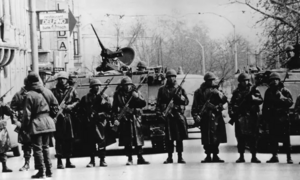July Incident
This article is incomplete because it is pending further input from participants, or it is a work-in-progress by one author. Please comment on this article's talk page to share your input, comments and questions. Note: To contribute to this article, you may need to seek help from the author(s) of this page. |
| 15 July Incident | |||||||
|---|---|---|---|---|---|---|---|
 A loyal unit of the Defence Force stands guard in the capitol during the coup. | |||||||
| |||||||
| Belligerents | |||||||
|
| ||||||
The 15 July Incident, often known as just the Incident, was an attempted coup d'état in Chanda on 15 July 1993. It was organized by elements of the Chandan armed forces controlled by the Golden Eagles of Chanda with the the goal of purging the government and military leadership of their factional rivals and ideological opponents in order to prevent constitutional reform from being passed.
Although the rebels succeeded in assassinating several leading officials (including a former president) and in occupying the most of the capita, they failed to assassinate President Akmal Sabir or secure control over the rest of the country. Furthermore the government had some forewarning that a coup was planned, which allowed for loyal security forces to respond almost immediately. Faced with a lack of support from the right, popular opposition from the public, and the army moving against them, the rebels surrendered on on the 17th.
Unlike other incidents involving the Internal State, attempted coup had significant consequences for Chanda. The Golden Eagles were purged from the government and its members were imprisoned or executed for treason. A wider crackdown against violent organisations led to the end of the political violence of the Years of Lead. Furthermore, the revelation that members of the Chandan Socialist Birlik Front was aware that a coup was planned led to severe political consequences. Many prominent members of the Front were arrested or expelled from the Front, which led to the collapse of the Front into various political parties. Despite the political turmoil, the proposed constitutional reform continued, which led to the Declaration of 1993.